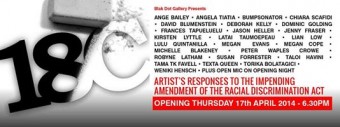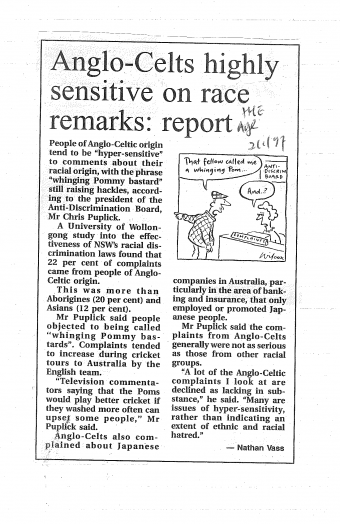 Ed’s note: I was invited to speak at Blak Dot Gallery at the opening of 18C – a quick response exhibition to the proposed amendments to the Racial Discrimination Act 1975. Here’s the full transcript of my speech.
Ed’s note: I was invited to speak at Blak Dot Gallery at the opening of 18C – a quick response exhibition to the proposed amendments to the Racial Discrimination Act 1975. Here’s the full transcript of my speech.
Keep your eyes peeled on Peril for a review of the opening night and a review of the exhibition!
* * *
I would like to acknowledge the traditional custodians of the land we’re on, the Elders past and present of the Kulin nations. I would like to also gratefully thank Blak Dot Gallery for their incredibly quick-thinking efforts in organising 18C and for providing a space for artists and writers and supporters to voice our opinions against a Government that would otherwise choose to silence our voices, in order to keep their position of power.
I would like to acknowledge and thank authors Dr Anita Heiss and Alice Pung for their incredible efforts in collating 175 responses from authors, writers, journalists, editors, publishers, directors, artists, filmmakers, academics and supporters which comprises our submission to the Attorney General’s proposed amendments to the Racial Discrimination Act.
(For the full submission, please see: 2014-04-14 Submission to the Attorney-General )
So, recently, I was turfing out old magazines and newspaper clippings when I found one that I had snipped out from 1997.
“Anglo-Celts highly sensitive on race remarks: report” published in The Age on January 2nd, 1997.
 Basically the report outlined how people of Anglo-Celtic heritage were “hyper-senstive” to comments about their racial origins. The highest on their list of complaints was “whinging Pommy bastard”, the racial insults peaking during the English team’s cricket tours to Australia.
Basically the report outlined how people of Anglo-Celtic heritage were “hyper-senstive” to comments about their racial origins. The highest on their list of complaints was “whinging Pommy bastard”, the racial insults peaking during the English team’s cricket tours to Australia.
That year, 1997, the University of Wollongong produced a study which found that “22 per cent of complaints came from people of Anglo-Celtic origin”. This was more than Indigenous Australians (20 per cent) and Asian Australians (12 per cent).
However, according to Mr Chris Puplick, the President of the NSW Anti-Discrimination Board at the time, many of the complaints by Anglo-Celtics are declined as “lacking in substance”, as “[m]any are issues of hyper-sensitivity, rather than indicating an extent of ethnic and racial hatred”.
Fast forward 17 years, and there are four sections of the Racial Discrimination Act that the Government would like to repeal including 18C, which makes it unlawful for someone to publicly “offend, insult, humiliate or intimidate” a person or a group of people.
In a report by the ABC, Senator Brandis said: “Those three words – offend, insult and humiliate – describe what has sometimes been called hurt feelings.”
“It is not, in the Government’s view, the role of the State to ban conduct merely because it might hurt the feelings of others.”
There is a big difference between being hyper-sensitive and being the victim of ethnic and racial hatred.
So, what has sparked these changes to the Racial Discrimination Act?
In an ABC report on Monday 14th April, Race Discrimination Commissioner Dr Tim Soutphommasane says “no major report or inquiry was provided by the Government prior to the release of the draft amendments. He says the only reason given was the case surrounding columnist Andrew Bolt.”
In our submission to the Exposure Draft, Kerry Reed-Gilbert, Chairperson of First Nations Australia Writers Network (FNAWN) writes:
“For one reason and one reason alone: that the Government’s mate Andrew Bolt lost his case and this Act is now being amended so that the mates can attack Aboriginal people, the target for their racial vilification. The mates will now be able to say what they want, when they want and there will be no protection for Aboriginal people at all.”
While there has been a lot of focus on the allowance of hate speech and bigotry, one of the subsections in the proposed changes, Subsection 3, is possibly the most dangerous because it veils who in the Government’s view is able to determine a person’s experience of racial villification. This standard is to be measured by an “ordinary reasonable member of the Australian community”. This “ordinary reasonable member of the Australian community”, does not belong to “any particular group within the Australian community”.
Journalist Waleed Aly critiques this flawed standard of measure in The Age, “Brandis’ race hate laws are whiter than white“:
“What race is this hypothetical ‘ordinary reasonable member of the Australian community’ meant to be, exactly? If you answered that they have no particular race, then you’ve just given the whitest answer possible. It’s the answer that assumes there is such a thing as racial neutrality. Of course, only white people have the chance to be neutral because in our society only white is deemed normal; only whiteness is invisible.”
“If the ‘ordinary reasonable Australian’ has no race, then whether or not we admit it, that person is white by default and brings white standards and experiences to assessing the effects of racist behaviour. Anything else would be too particular.
“This matters because – if I may speak freely – plenty of white people (even ordinary, reasonable ones) are good at telling coloured people what they should and shouldn’t find racist, without even the slightest awareness that they might not be in prime position to make that call.”
I am of Peranakan Chinese Malaysian heritage, my family had the economic means to leave a Malaysia that politically marginalises its minorities in legislation. I was 14 when I migrated to Australia in 1991. In 1996, Pauline Hanson made her maiden speech in Parliament. As a new migrant to the country, I was shocked by Hanson’s maiden speech asserting that Australia was “in danger of being swamped by Asians” and ‘Aboriginals received more benefits than non-Aboriginals’. Hanson’s speech was politically inflammatory, in fact she continues to be like this – you just have to visit One Nation’s website. On the home page, amongst one of the “serious problems in our country” is point no 2 – “Immigration and Multiculturalism – have we ever been asked?” Furthermore, in the original principles and objectives of the party, no 19 is:
“To abolish divisive and discriminatory policies, such as those related to Aboriginal and multicultural affairs.”
George Brandis doesn’t need to legislate for the rights of bigots, it’s already in existence.
Over my 20 years of living in this country, I am constantly questioning and navigating my identity as an Australian, how I feel about calling Australia home. In calling Australia home, I also realise that as a non-Indigenous Australian, I benefit from the continued history of dispossession still experienced by Indigenous Australians.
Says Kerry Reed-Gilbert in our submission to the Exposure Draft
“In this country other cultures are allowed to be Chinese-Australian, Irish-Australian etc. Their cultural and religious details are collected, acknowledged and respected. I find that in this country – our country – that respect and honour is not given to Aboriginal people and due to government laws and media portrayals, we are the ‘Other’. The ‘Other’ who are devalued and disregarded continually by those who now call this country home. With the proposed amendments to this Act, Aboriginal people will become a bigger target for others to vilify.”
The Australia I want to call home, the Australian I want to be, is about exploring an identity and a relationship to place that respects and honours Aboriginal and Torres Strait Islander Australians, not the other way round as these proposed amendments to the Racial Discrimination Act would like to establish.
In conclusion, I want to read out the last statement in the submission prepared by Dr Anita Heiss and Alice Pung:
“We have never felt our freedom of speech threatened by the current Racial Discrimination Act 1975. We firmly oppose the proposed amendments to the Act. We submit that we will endeavour to do all we can in our respective fields to ensure that Australia does not become a country that condones ‘bigotry’ – unsubstantiated and untrue racist comments and discourse that incite hatred towards others.”
